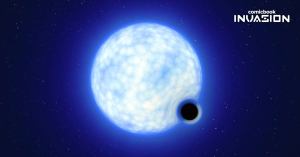Out there, somewhere in the cosmos, there could be a traversing black hole no longer at the center of its galaxy. In a journal published by the American Astronomical Society, scientists have noticed the supermassive black hole thought to be the center of Abell 2261 may no longer there. Instead, scientists say it could have been removed from its own galaxy due to a process known as gravitational wave recoil.
Videos by ComicBook.com
During a recoil, two black holes near each other essentially merge, sending ripples across space. In theory, these ripples could push the black hole away from its current location, according to a report filed by Forbes. “That’s enough to kick the black hole entirely out of the galaxy and be long gone. It would be cruising in intergalactic space,” Kayhan Gultekin, the paper’s lead astronomer, told the magazine.
In the piece, publishers of the initial journal make sure to point out could technically still be in its current location; it’s just that they’re unable to locate it now after being able to locate it on previous occasions.
“Yet Gultekin says it’s too soon to conclude there isn’t a supermassive black hole in A2261-BCG,” Forbes adds. “But if it’s not there, it would be the only such large galaxy yet discovered without such a massive black hole at its center. Even our own Milky Way’s supermassive black hole is relatively quiescent but it’s there.”
In an interview with Vice last summer, Gultekin admitted there’s still much to learn about black holes, and solving this mystery could go a long way in answering some of the biggest outstanding questions.
“What excites me the most is learning about supermassive black holes through gravitational waves,” Gultekin said. “We need to know for certain that they are merging and this would be one way of showing that that’s happening.”
“There are all sorts of things you can learn with gravitational waves about supermassive black holes, as a population or individual sources, that you are either really hard or impossible to learn with traditional electromagnetic astronomy,” he added.
Cover photo by Photo12/Universal Images Group via Getty Images





